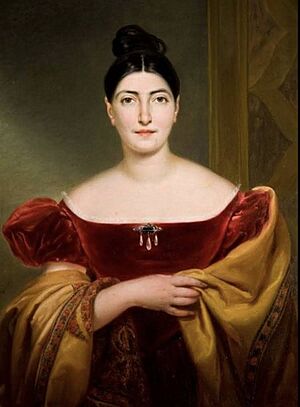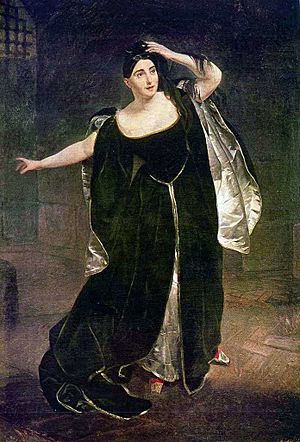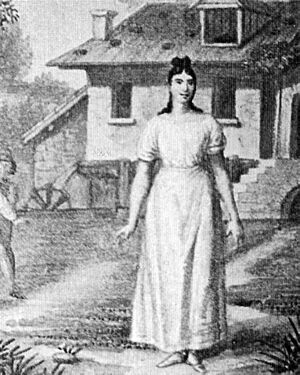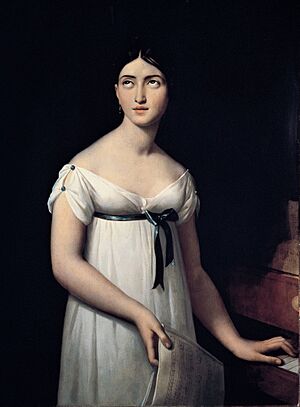Giuditta Pasta facts for kids
Quick facts for kids
Giuditta Pasta
|
|
|---|---|

Portrait held at Villa Roccabruna, by an unknown artist
|
|
| Born |
Giuditta Angiola Maria Costanza Negri
26 October 1797 Saronno, Cisalpine Republic
|
| Died | 1 April 1865 (aged 67) Blevio, Italy
|
| Occupation | Opera singer |
| Years active | 1823–1854 |
Giuditta Pasta (born Negri; October 26, 1797 – April 1, 1865) was a very famous Italian opera singer. She was a soprano, which means she sang high notes. Many people think she was one of the greatest singers of her time. Some have even compared her to the famous 20th-century singer Maria Callas.
Contents
Giuditta Pasta's Amazing Career
Starting Her Journey
Giuditta Angiola Maria Costanza Negri was born in Saronno, a town near Milan, Italy. This happened on October 26, 1797. Her family, the Negri family, came from Lomazzo. Her father was a soldier in the Napoleonic Army.
Giuditta studied singing in Milan with several great teachers. In 1816, she married a fellow singer named Giuseppe Pasta. She then started using his last name, becoming Giuditta Pasta. That same year, she performed in her first opera, Le tre Eleonore, in Milan. Later, she sang in Paris in famous operas like Don Giovanni.
Her first performance in London in 1817 was not very successful. After more singing lessons, she had a great debut in Venice in 1819. She became very popular in Paris in 1821–1822. This was especially true when she sang the role of Desdemona in Gioachino Rossini's opera Otello.
Special Roles Just for Her
Giuditta Pasta sang regularly in big cities like London, Paris, Milan, and Naples. This was between 1824 and 1837. In Milan, three important opera roles were written especially for her voice.
These roles included the main character in Gaetano Donizetti's Anna Bolena in 1830. This opera became a huge success for Donizetti. She also created the roles of Amina in Vincenzo Bellini's La sonnambula and Norma in his opera Norma. Both of these were in 1831. These three roles became some of her most famous performances.
Later Years and Teaching
Giuditta Pasta stopped performing regularly in 1835. After that, she sang only sometimes. She gave performances in London in 1837 and in Germany and Russia in 1840–1841.
Later in her life, Pasta taught singing in Italy. Some of her students became famous singers themselves. These included Emma Albertazzi and Marianna Barbieri-Nini. Another student was Carolina Ferni, who also became a well-known Norma.
Giuditta Pasta passed away in Blevio, a town in Italy, on April 1, 1865. She was 67 years old.
Giuditta Pasta's Unique Voice
People described Giuditta Pasta's voice as very special. A reviewer in 1824 said her voice was a mezzo-soprano. This means it was between a soprano and a contralto. They said it was clear, powerful, and had a wide range. She could sing two octaves, which is a lot of notes.
Her middle notes were described as beautiful and full. Even though some high and low notes could be a bit rough, she was always perfectly in tune. This was a rare and important skill.
A writer named Stendhal described her voice as being able to sing both low contralto notes and high soprano notes easily. He said her voice had more than one "timbre," which means it had different qualities or colors. This made her singing very expressive and allowed her to show many different emotions.
In 1829, a critic called her the "singer of passions." He said her voice was perfect for showing the strongest feelings. She also used her body and actions to express these emotions on stage. This was something new in opera at the time.
Giuditta Pasta was very important because of how much she influenced opera. Her career happened when opera was changing from Rossini's style to the works of Bellini and Donizetti. She helped shape how opera was performed and understood during this exciting time.
 | Lonnie Johnson |
 | Granville Woods |
 | Lewis Howard Latimer |
 | James West |




